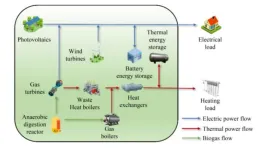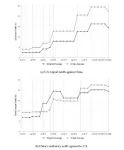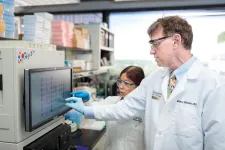(Press-News.org) A new paper shows how partnering with the community can lead to more inclusive health care, especially for individuals with autism and other neurodevelopmental disabilities. The article, published this week in Pediatrics, details the success of a unique COVID-19 and flu vaccine clinic at the UC Davis MIND Institute.
The clinic team includes developmental-behavioral pediatricians, child life specialists, nurses, psychologists, social workers and staff trained to help families navigate health care. The goal is not only to administer vaccines, but to help patients build skills needed to successfully complete medical procedures for the rest of their lives.
Listening to the needs of community members
Autistic individuals and those with other neurodevelopmental disabilities are more likely to experience medical trauma. Their health care needs are more likely to be unmet, and vaccination rates are low.
Co-author Katharine Harlan-Owens is familiar with the challenges. In the paper, she recalled taking her son, who is autistic and has ADHD (attention-deficit/hyperactivity disorder) to a walk-in flu vaccination clinic a few years ago.
“He is very needle phobic, so when the nurse entered the examination room holding a syringe in her hand, he jumped off the table and ran straight into a glass door,” she wrote.
In 2021, she and others at the MIND Institute’s Center for Excellence in Developmental Disabilities asked caregivers, self-advocates and community groups about their health care experiences. They used that feedback to develop the seasonal vaccine clinic.
The authors wrote that “… caregivers consistently described fear about completing recommended health care procedures as their children got older and restraint became more challenging.”
A partnership with families
After fine-tuning the clinic design with input from a community advisory group, the team opened the COVID-19 vaccine clinic in the fall of 2021. It was one day a week for individuals of all ages with neurodevelopmental disabilities.
The authors noted that keys to success included:
Training providers about neurodiversity and how to support patients
Meeting with families before their appointment to help them prepare and create an individualized care plan
Avoiding the use of restraints
Providing visual and sensory support for patients
Longer appointments
Dedicated parking and a separate entrance
A calm post-vaccination waiting room with incentives (a small toy or snack)
Co-author Erin Roseborough, a child life specialist, noted that longer appointments enable patients to become familiar with the environment and reduce anxiety. “This approach allows staff to use strategies to develop trust, understand communication styles and build positive interactions with a patient and caregiver prior to the procedure.”
A team member talked with each family before their appointment using a specialized intake form to create an individualized care plan. They asked about things such as developmental needs, successful coping strategies and preferred items like toys or food. They also shared resources to help families prepare for the visit.
“If a family told us their child liked SunChips and PAW Patrol during the intake, when they arrived, we had PAW Patrol playing on a tablet and SunChips on the table, and they also happened to get a vaccine,” wrote developmental-behavioral pediatricians Van Ma and Scott Akins in the paper.
Ma is the lead author and Akins, a co-author, is the medical director at the MIND Institute.
Remarkable results
In the first two years of the COVID-19 vaccine clinic, the team vaccinated 354 people with neurodevelopmental disabilities ranging from age 3 to 75. The success rate — measured by people receiving the vaccine without restraint — was 99.3%.
In 2023, they offered both COVID and flu shots and vaccinated 91 people with a 100% success rate.
This year, both vaccines are again offered.
“The success rates were much higher than we anticipated,” wrote Ma and Akins. “This initiative taught us the value of creating long-term partnerships that are truly patient and family-led and rooted in the expertise of those with lived experience.”
Harlan-Owens brought her autistic son to the vaccine clinic at the MIND Institute. She was nervous, given his previous negative experience.
At first, he hid behind a table, crying. But with the help of the child life specialist, sensory support and a nurse who made sure he never saw a needle, he was successfully vaccinated.
“Our experience shows the power one positive vaccination experience can have,” she wrote. “He is now able to tolerate vaccinations in his pediatrician’s office and even in busy, loud pharmacies.”
Building on the clinic’s success
As a result of lessons learned in the clinic, UC Davis Health has launched the PATH (Promoting Accessibility To Healthcare) Program. The Children’s Miracle Network-funded project aims to improve health care experiences for neurodiverse children and their families throughout the health system. This also includes a specialty blood draw clinic.
Additional co-authors included Veronica Tuss, Melissa Mello and Aubyn Stahmer, all of UC Davis.
END
Community partners key to success of vaccine clinic focused on neurodevelopmental conditions
COVID-19 and flu PATH vaccine clinic at UC Davis MIND Institute featured in the journal Pediatrics
2024-11-14
ELSE PRESS RELEASES FROM THIS DATE:
Low-carbon collaborative dual-layer optimization for energy station considering joint electricity and heat demand response
2024-11-14
In a significant step towards achieving the "Carbon Peaking and Carbon Neutrality" goals, researchers at the Chinese Academy of Sciences, University of Chinese Academy of Sciences, Beijing Institute of Technology, in collaboration with Hohai University, have developed a groundbreaking dual-layer optimization strategy for park-level integrated energy systems (PIES). This strategy, which integrates electricity and heat demand response, significantly boosts the economic efficiency and low-carbon operation ...
McMaster University researchers uncover potential treatment for rare genetic disorders
2024-11-14
Hamilton, ON, Nov. 14, 2024, In a groundbreaking study, researchers at McMaster University have identified a potential treatment for Sandhoff and Tay-Sachs diseases—two rare, often fatal lysosomal storage disorders that cause progressive damage to nerve cells in the brain and spinal cord.
After years of investigating the diseases’ underlying mechanisms, the research team has identified an existing FDA-approved drug that could significantly improve quality of life for affected patients and their families.
“Sandhoff and Tay-Sachs are devastating diseases,” ...
The return of protectionism: The impact of the Sino-US trade war
2024-11-14
Since 2018, Sino-US economic and trade relations have become increasingly tense. Between 2018 and 2019, the US imposed seven rounds of tariffs on China, to which China responded with retaliatory measures. The simple average tariff rates on US imports from China rose from 4.07% in January 2018 to 24.43% in December 2019, while the simple average tariff rates on Chinese imports from the US increased from 9.32% in January 2018 to 22.53% in December 2019 (see figure 1).
Consequently, the share of Chinese goods in US imports declined significantly — ...
UTokyo and NARO develop new vertical seed distribution trait for soybean breeding
2024-11-14
We have probably all seen a soybean plant, about 1 meter high with leaves and pods compactly arranged on a main stem with a few short side branches. The wild relative of the domesticated soybean is a long vine with pods widely distributed on many side branches. Plant breeding by farmers thousands of years ago is to thank for this dramatic change.
As human population increases and protein demand doubles, modern plant breeders must further optimize soybean plant architecture and per plant yield for modern farming systems. Conventional ...
Research into UK’s use of plastic packaging finds households ‘wishcycle’ rather than recycle – risking vast contamination
2024-11-14
Lancaster University researchers investigating consumer attitudes and behaviours around plastic food packaging have found UK households are ‘wishcycling’ rather than recycling – and say it’s a problem that everyone - government, food producers, waste management and residents – has to solve.
Wishcycling – the act of putting packaging in recycling bins and hoping for the best, rather than knowing it’s recyclable – is something households are doing due to confusing product labels and differing recycling facilities around the country, experts warn.
The academics behind Lancaster ...
Vaccine shows promise against aggressive breast cancer
2024-11-14
A small clinical trial shows promising results for patients with triple-negative breast cancer who received an investigational vaccine designed to prevent recurrence of tumors. Conducted at Washington University School of Medicine in St. Louis with a therapy designed by WashU Medicine researchers, the trial is the first to report results for this type of vaccine — known as a neoantigen DNA vaccine — for breast cancer patients.
The study, which found the vaccine to be well-tolerated and to stimulate ...
Adverse events affect over 1 in 3 surgery patients, US study finds
2024-11-14
Adverse events affect more than a third (38%) of adults undergoing surgery, finds a study of admissions to 11 hospitals in the US state of Massachusetts, published by The BMJ today.
Of the 1009 admissions analysed, nearly half were classified as major (resulting in serious, life threatening or fatal harm) and the majority were considered as potentially preventable.
Although this study may not fully represent hospitals at large, the findings show that “adverse events remain widespread in contemporary ...
Outsourcing adult social care has contributed to England’s care crisis, argue experts
2024-11-14
Outsourcing adult social care services in England to the private sector since the 1980s has led to worse care and should be rolled back, argue experts in The BMJ today.
Benjamin Goodair at the Blavatnik School of Government, University of Oxford and colleagues suggest that removing the profit motive would help improve quality and reduce inequities.
Social care, sometimes referred to as community, residential, or personalised care, for older people and people with physical and mental disabilities is facing record demand but performing worse than any time in recent history, they explain.
One contributor to this, they say, is the outsourcing of care provision from the ...
The Lancet: Over 800 million adults living with diabetes, more than half not receiving treatment, global study suggests
2024-11-14
**Correction**
A subheading in the press release sent yesterday was incorrect - the line 'Global rates of diabetes doubled over the last two decades' should be ''Global rates of diabetes doubled over the last three decades'.
The subheading and two further occurrences of the same mistake have been corrected in the copy below (in yellow). The rest of the press release remains unchanged.
We sincerely apologise for any inconvenience caused,
The Lancet press office (pressoffice@lancet.com).
The ...
New therapeutic approach for severe COVID-19: faster recovery and reduction in mortality
2024-11-14
A new clinical study shows that an inhibitor of Fas ligand (FasL), also called CD95 ligand (CD95L), led to a faster recovery of COVID-19 patients and reduced mortality. On average, it took eight days to recover for patients who received asunercept, a biotherapeutic FasL inhibitor, compared to 13 days in the control group. In addition, mortality was decreased by about 20 per cent. The study ‘Efficacy and safety of asunercept, a CD95L-selective inhibitor, in hospitalised patients with moderate-to-severe COVID-19: ASUNCTIS, a multicentre, randomised, open-label, controlled, phase 2 trial’ ...
LAST 30 PRESS RELEASES:
1 in 6 Medicare beneficiaries depend on telehealth for key medical care
Maps can encourage home radon testing in the right settings
Exploring the link between hearing loss and cognitive decline
Machine learning tool can predict serious transplant complications months earlier
Prevalence of over-the-counter and prescription medication use in the US
US child mental health care need, unmet needs, and difficulty accessing services
Incidental rotator cuff abnormalities on magnetic resonance imaging
Sensing local fibers in pancreatic tumors, cancer cells ‘choose’ to either grow or tolerate treatment
Barriers to mental health care leave many children behind, new data cautions
Cancer and inflammation: immunologic interplay, translational advances, and clinical strategies
Bioactive polyphenolic compounds and in vitro anti-degenerative property-based pharmacological propensities of some promising germplasms of Amaranthus hypochondriacus L.
AI-powered companionship: PolyU interfaculty scholar harnesses music and empathetic speech in robots to combat loneliness
Antarctica sits above Earth’s strongest “gravity hole.” Now we know how it got that way
Haircare products made with botanicals protects strands, adds shine
Enhanced pulmonary nodule detection and classification using artificial intelligence on LIDC-IDRI data
Using NBA, study finds that pay differences among top performers can erode cooperation
Korea University, Stanford University, and IESGA launch Water Sustainability Index to combat ESG greenwashing
Molecular glue discovery: large scale instead of lucky strike
Insulin resistance predictor highlights cancer connection
Explaining next-generation solar cells
Slippery ions create a smoother path to blue energy
Magnetic resonance imaging opens the door to better treatments for underdiagnosed atypical Parkinsonisms
National poll finds gaps in community preparedness for teen cardiac emergencies
One strategy to block both drug-resistant bacteria and influenza: new broad-spectrum infection prevention approach validated
Survey: 3 in 4 skip physical therapy homework, stunting progress
College students who spend hours on social media are more likely to be lonely – national US study
Evidence behind intermittent fasting for weight loss fails to match hype
How AI tools like DeepSeek are transforming emotional and mental health care of Chinese youth
Study finds link between sugary drinks and anxiety in young people
Scientists show how to predict world’s deadly scorpion hotspots
[Press-News.org] Community partners key to success of vaccine clinic focused on neurodevelopmental conditionsCOVID-19 and flu PATH vaccine clinic at UC Davis MIND Institute featured in the journal Pediatrics



